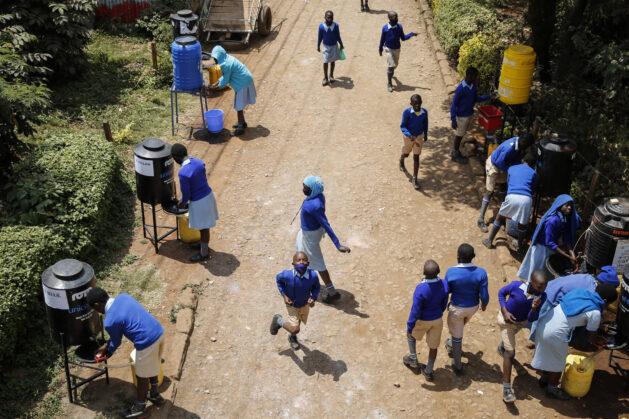Africa-Press – Mauritius. In their Brookings essay, “Did Africa turn a corner in 2020 or did it just dodge a bullet?” Indermit Gill and his co-author Kenan Karakullah take issues with three assertions made by Vera Songwe of UNECA and Brookings AGI during the launch of AGI’s Foresight Africa 2021 at which she was a panellist.
Songwe had advanced three main lessons emerging from the continent in 2020: Resilience – the continent is more resilient than otherwise believed; Divergence – the economies of the continent are more divergent than previously believed because it contains many more middle-income countries today;
A renewed thirst for continental integration – evident in the African Continental Free Trade Area (AfCFTA) that nominally came into effect on 1 January 2021.
Conflicting views Indermit Gill and his co-author Kenan Karakullah (I will refer to them as G&K going forward) appear to disagree with Songwe and her fellow panellists.
They acknowledge that Africa has always been heterogeneous but argue that the divergence of consequence in Africa today is not that between middle-income and low-income African countries but that within Africa’s middle-income countries.
They state that “neither a debt moratorium nor a continental trade accord will mean much unless the sub-continent’s largest economies – Angola, Nigeria, and South Africa – begin to do a lot better.
”
In an implicit reference to the resilient Africa argument, G&K argue that Africa in 2021 will be bedevilled by debt, falling commodity prices (and falling government revenues), as well as adverse terms of trade, and China, all of which will constrain the continent’s response to Covid-19 and its ability to build back from it, and conclude that:“Economic exigencies associated with Covid-19 will not be Africa’s problem in 2021, but commodities, currencies, and China.
I believe that it is too early to draw definitive lessons on how effectively African countries attenuated the economic risks associated with the Covid-19 crisis and the factors that made that possible.
As G&K, state, divergence (heterogeneity) has always characterized the continent and is not a new phenomenon: there is divergence between Francophone and Anglophone countries in economic performance.
The middle-income countries of southern Africa have always diverged from the rest of the continent. North Africa has always diverged from the rest. And assuming that these divergences did not exist or matter and only the divergence by income did is incorrect.
I agree with them in parts. Divergence Divergence by income among African countries did not just emerge as a source of resilience. According to World Bank data, there were 27 low-income African countries in 2012 against 25 in 2020, just a decrease of two.
Further, the divergence within middle-income African countries (which has always been there) does not matter much for each individual African country’s response to COVID-19 insofar as the continent’s three largest economies, because of the limited trade links among African countries.
Angola, Nigeria, and South Africa may have done horribly last year in terms of growth but it is unlikely that they performed worse than the US and advanced economies. Their poor performance is obvious because these economies are more integrated into the global supply chain than most African low-income countries.
The “depressing drag by Angola, Nigeria, and South Africa” would matter for the rest of the continent if these countries were integrated with the rest of the continent. At this moment, they are not. The divergence that was very obvious in 2020 was the divergence in appetite (or taste for) for debt and debt relief.
While in the past African countries in one voice called for debt relief, in 2020, a number of countries, including low-income Benin and low middle-income Nigeria, decided not to join the chorus for debt relief for themselves.
They feared/recognized the adverse signalling effects of debt relief and the fact that it could raise the cost of borrowing for them in the future. Just as divergence among African countries by income is not a likely explanation for the subdued adverse economic impact of Covid-19 on the continent’s economies, neither is resilience.
In 2016, Frontier Strategy Group published a list of SSA’s most and least resilient economies based on an index, Sub-Saharan Resilience to External Shocks Index (RESI), that it had developed.
It defined resilience as: “the ability to maintain economic, social and political stability despite external shock due to stronger fundamentals, internal buffers and self-sufficiency.
The index had the following components: political stability, trade exposure, economic diversification, wealth and productivity, and ranged in value from 0 (least resilient) to 100 (most resilient).
Using this index, it found that 35 of 46 SSA countries studied had a RESI of 55 and above and 20 had a RESI of 60 and above. In a Brookings blog, Landry Signe, pointing to the increasing: Competitiveness of Africa’s economies;
Africa’s support for the ongoing trend toward better and more accountable governance resulting in elections, term limits and increased civic participation; positive demographic trends (rising population, rising disposable income, and rising urbanization);
Africa’s innovative and productive potential attractive substantial foreign investment and finance; and Increasing diversification of Africa’s trade patterns and the soon-to-come-into-effect AfCFTA
From that he asserts hat Africa is more resilient than you think, though Landry did not provide evidence to support his claim. Resilience Resilience comes in many forms.
The resilience that should matter for the purposes of our analysis, whether it be economic resilience – at the micro, household level and at the macro-level.
In the immediate aftermath of the declaration of Covid-19 as a pandemic, many African countries imposed measures that locked down their economies and imposed costs on households and firms.
Governments took a number of measures to minimize immediate aggregate consumption losses arising from the lockdown. A number of policies were also taken to minimize production losses. Besides, many African countries received significant foreign support to minimize losses associated with the pandemic.
In countries like South Africa, Ghana and Nigeria that imposed limited lockdowns and provided “palliatives” to their citizens, it became very obvious early on that the cost of the palliatives would be very high and unaffordable.
Very quickly, the lockdown was lifted. Estimates of how much Africa’s economies would contract as a consequence of the pandemic range from $65-75bn. However, there are no direct quantitative measures of consumption loss and how effectively governments have minimized them.
Clearly, as the US Economic Development Administration points out, the ability to minimize consumption losses and to recover quickly are important measures of resilience.
Given that many countries did not implement strict lockdown measures for reasons such as the high social and political consequences of doing so given the weakness or near absence of social protection measures/schemes, absence of insurance and other consumption smoothing mechanisms and instruments, it is unlikely that the aggregate consumption losses are very high.
Since the Covid-19 pandemic is yet to be extinguished, it is too early to say anything definitive about the resilience of Africa’s economies with respect to how quickly they have recovered from the pandemic (resilience in the dynamic sense).
In any case, given that most African countries did not completely lockdown their economies, there is probably not much to rebuild and recover from. Nonetheless, the adverse consequences of the lockdown are becoming obvious and manifest: Nigeria is looking for ways to increase borrowing, including raiding dormant accounts and unclaimed dividends.
South Africa’s President recently declared “We have no money” according to the Financial Times of 6 February 2021. It is therefore too early to declare that African countries “have surprised everyone with their resilience during the coronavirus crisis”.
The crisis has not abated. Regional integration For years, Africans, their governments and their friends have looked to regional integration as the panacea to the continent’s development challenges.
They make these arguments forgetting that each African country is a regional integration arrangement and ignore that these “regional integration arrangements” have not worked very well since the departure of colonial powers.
For some reason, there is this blind faith that integrating poorly performing albeit small regional integration arrangements will produce a big regional integration arrangement that will work for all.
Hope in the possibilities of regional integration has been rekindled by the AfCFTA on which Africa’s hopes for a prosperous future is now hoisted. The AfCFTA has become the shibboleth among African policymakers, analysts, UN bureaucrats and African Union bureaucrats.
To question and/or express scepticism about it is haram. Yet, there is nothing about the AfCFTA that makes me share the hopes and enthusiasm now evident in policy and government circles on the continent.
In 1991, the then Organization of African Unity (OAU) adopted the Abuja Treaty on the African Economic Community (AEC) which remains the roadmap for Africa’s regional integration.
The AEC identified 5 stages (in ascending order) of regional integration: a Free Trade Area followed by a Customs Union followed by a Common Market followed by an Economic Union and eventuating in Political Union.
The Abuja Treaty defined the regional economic communities (RECs) – ECOWAS, IGAD, SADC, as the building blocks of African integration which should pass through each of the stages. Very few of these RECs have even succeeded at the first or second stages of the integration process.
Yet those who see pan-Africanism as a religion have decided to vault to the AfCFTA even though a lot remains to be done to tease out its contours: rules of origin are yet to be agreed; disciplines are yet to be worked out and agreed.
The vexing issue of compensation for foreign trade losses remains even though Afreximbank has agreed to provide a compensation mechanism for countries that would suffer trade revenue losses.
In any case, for most countries, border revenues from intra-African trade at the moment is zero since African countries seldom trade with each other. Bottom line
In conclusion, if the impact of the pandemic on Africa’s economies has so far been less than was expected, this was neither due to divergence or resilience; it was because Africa’s economies had very little to lose since they did not impose the severe lockdowns that Europe and many other economies imposed.
And it is way too early to see the AfCFTA as encouraging a development as some (not including this sceptic) may see it – as a source of resilience for Africa’s economies.
This time, Africa did not dodge a bullet. The world is still confronting the pandemic in spite of the promise of containment made possible by the arrival of vaccines.
According to Africa CDC, there is an on-going surge of SARS-CoV-2 infections on the continent (with the possibility that vaccine-resistant mutations may emerge).
For More News And Analysis About Mauritius Follow Africa-Press







